The nation’s two foremost organizations representing expertise in donation and transplant warned federal policymakers this week that the US’ world leading system of organ donation and life-saving transplant will be jeopardized if policy is driven by misinformation, unsubstantiated anecdotal allegations, and defamatory remarks from an unbalanced panel of witnesses that did not include a single donation professional. The United Network for Organ Sharing (UNOS) and the Association of Organ Procurement Organizations (AOPO) both released statements following a legislative subcommittee hearing in Washington DC where baseless charges took the place of reasoned discussions on the future of the donation and transplant system.
UNOS, the federal contractor that has been operating the Organ Procurement and Transplant Network for decades and has coordinated over one million transplants, released two statements “UNOS sets the record straight” and “UNOS fires back at defamatory statements that it has acted unlawfully” which took to task a number of statements made during the hearing. In the latter statement, UNOS said,
“At a hearing of the House Energy and Commerce Committee’s Oversight Subcommittee on Sept. 11 to discuss HRSA’s implementation of the Organ Procurement and Transplantation Network (OPTN) reform law, several witnesses made false statements under oath alleging violations of the law by UNOS while the non-profit served as OPTN. These individuals were able to produce no evidence of their claims, because it does not exist…. UNOS has been the international leader in organ donation and transplant for decades, and anyone who questions our motivations or accuses UNOS of unlawful activity is just plain wrong.” (emphasis added)
The UNOS statements make point-by-point rebuttals of the hearings most outrageous allegations.
In its own statement, AOPO, the organization representing 48 organ procurement organizations that have driven 13 consecutive years of record-breaking numbers of organ donors in the US, expressed similar concerns. AOPO warned that unsubstantiated claims seeking to grab headlines are recklessly damaging public trust in organ donation and diverting policymakers from the real (more complex) issues facing the system and transplant patients today. They wrote in “AOPO Statement on Organ Transplantation Hearing”:
“Based on the publicly available witness testimony, it appears that – once again – our lawmakers are being directed away from the truths about our system to instead discuss a litany of false, misleading, and unsupported allegations, featuring an unbalanced panel of witnesses who reinforce the narrative that erodes public trust in the organ transplantation system.
Stunningly, scant attention is given to the most alarming issue in transplantation today: the crisis of organ nonuse, in which thousands of transplantable organs go to waste every year. It’s a secondary loss to donor families and a tragedy for patients that die awaiting a life-saving transplant. Today, OPOs are recovering enough organs that no one should die on the transplant waitlist. Yet these organs are not being transplanted. This crisis is largely ignored even though solving it is the single fastest way to save the lives of people dying on the waiting list.”
New England Donor Services agrees with UNOS and AOPO that now is the time for serious, thoughtful and informed policy discussions to take place that must include the professionals and experts who actually do the work of donation and transplant. Policy must be based on facts, data and real-world professional experts, not unsubstantiated hearsay and personal attacks. Further, spreading myths and misinformation based on hearsay is dangerous in any setting but particularly disturbing when involving organ donation and during a Congressional hearing. Such disinformation undermines the public trust and, in doing so, could cost lives.
Read all three statements here:
UNOS fires back at defamatory statements that it has acted unlawfully

